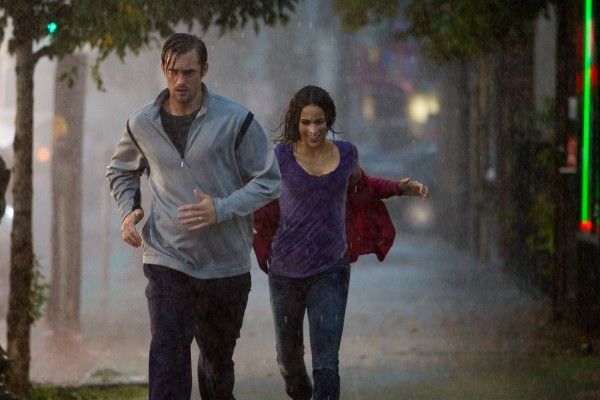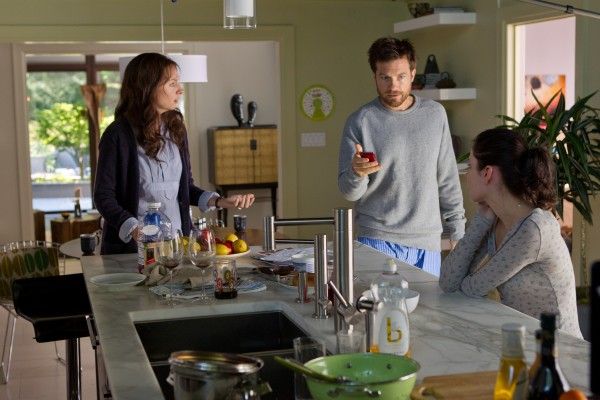Modern technology has radically changed the way we interact socially. Go stand in a line, and I guarantee at least a few people will have whipped out their smartphones and are happily ignoring the world around them. We don't call anymore; we text as if that were the same as a discussion. As author, psychologist, and MIT professor Sherry Turkle recently noted in a New York Times editorial this past April, "we have sacrificed conversation for mere connection." Henry Alex Rubin's Disconnect ignores this contemporary issue, and sacrifices worthwhile social commentary for mere cautionary tales. Disconnect has all the dramatic weight of a driver's education video, but then pads its thin plots with three loosely-connected narratives, two of which feature character actions so ludicrous that the movie becomes almost completely disconnected from reality.Disconnect is three stories, with each plot a dire warning about this new-fangled Internet technology. One story is about a local TV reporter (Andrea Riseborough) and her relationship with a young man (Max Thieriot) who does sex-cam shows. Another follows a married couple (Alexander Skarsgard and Paula Patton) who have their identity stolen, and are plunged further into debt. The third tale revolves around two high school kids (Colin Ford and Aviad Bernstein) who pretend to be a teenage girl on Facebook so they can play a cruel prank on their shy classmate (Jonah Bobo). Webcam sex shows, identity theft, and cyber-bullying: these are the defining issues of the Internet age according to Disconnect. The film initially does a solid job of showing how the Internet creates a false sense of intimacy, and causes us to ignore the real relationships in our lives. However, it then moves into bland, obvious set-ups that serve as warnings to the viewer. There's not an ounce of subtlety in the picture. We're not left to think about how the Internet age has affected society; we're left thinking we should probably change our Internet passwords and talk to our kids about not friending people they haven't met in real life.After the film has finished warning the audience about things they're already aware of, Disconnect still has 70 minutes left to burn, so each story is pulled even thinner as most of the characters behave incompetently. The married couple decides to personally hunt their identity thief because the police aren't acting quickly enough. The reporter shatters professional boundaries, and develops feelings for her source. The only story with any trace of real humanity is when the bullied kid's father (Jason Bateman) goes online to find out what happened to his son. It's done in a heavy-handed fashion, but at least it has some semblance of honesty, especially due to the strong performances from Bateman and Ford who have to rely solely on facial expressions during their online chats.
Webcam sex shows, identity theft, and cyber-bullying: these are the defining issues of the Internet age according to Disconnect. The film initially does a solid job of showing how the Internet creates a false sense of intimacy, and causes us to ignore the real relationships in our lives. However, it then moves into bland, obvious set-ups that serve as warnings to the viewer. There's not an ounce of subtlety in the picture. We're not left to think about how the Internet age has affected society; we're left thinking we should probably change our Internet passwords and talk to our kids about not friending people they haven't met in real life.After the film has finished warning the audience about things they're already aware of, Disconnect still has 70 minutes left to burn, so each story is pulled even thinner as most of the characters behave incompetently. The married couple decides to personally hunt their identity thief because the police aren't acting quickly enough. The reporter shatters professional boundaries, and develops feelings for her source. The only story with any trace of real humanity is when the bullied kid's father (Jason Bateman) goes online to find out what happened to his son. It's done in a heavy-handed fashion, but at least it has some semblance of honesty, especially due to the strong performances from Bateman and Ford who have to rely solely on facial expressions during their online chats. Identity theft, cyber-bullying, and underage sex performers are all serious problems, but they're not the defining issues of communication in the Internet age. Couples don't have trouble talking to each other because identity theft exists. Parents don't have trouble talking to their kids because cyber-bullying exists. (The third story is just weird; it has almost no connection to the other two stories, but I guess "3" is a magic number) It's amusingly ironic that Rubin wants to cite the Internet as a reason we're disconnected from each other when his movie is disconnected from how the Internet fundamentally affects our relationships.Rating: D-For all of our TIFF 2012 coverage, click here. Here are links to all of my TIFF 2012 reviews:
Identity theft, cyber-bullying, and underage sex performers are all serious problems, but they're not the defining issues of communication in the Internet age. Couples don't have trouble talking to each other because identity theft exists. Parents don't have trouble talking to their kids because cyber-bullying exists. (The third story is just weird; it has almost no connection to the other two stories, but I guess "3" is a magic number) It's amusingly ironic that Rubin wants to cite the Internet as a reason we're disconnected from each other when his movie is disconnected from how the Internet fundamentally affects our relationships.Rating: D-For all of our TIFF 2012 coverage, click here. Here are links to all of my TIFF 2012 reviews:
- Anna Karenina
- Argo
- Arthur Newman
- Byzantium
- Cloud Atlas
- End of Watch
- Hyde Park on Hudson
- The Iceman
- Imogene
- Inescapable
- A Late Quartet
- Looper
- The Master
- Much Ado about Nothing
- On the Road
- The Perks of Being a Wallflower
- The Place Beyond the Pines
- Seven Psychopaths
- Sightseers
- Silver Linings Playbook
- Spring Breakers
- Stories We Tell
- To the Wonder

